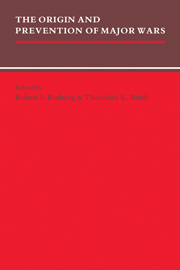Book contents
- Frontmatter
- Contents
- Introduction
- The Origins of War: Structural Theories
- The Theory of Hegemonic War
- The Origins of War in Neorealist Theory
- The Contribution of Expected Utility Theory to the Study of International Conflict
- The Origins of War: Explanation of Non-rational Causality
- Lessons and Analogies from Early Major Wars
- Lessons and Analogies from the World Wars
The Contribution of Expected Utility Theory to the Study of International Conflict
Published online by Cambridge University Press: 02 December 2009
- Frontmatter
- Contents
- Introduction
- The Origins of War: Structural Theories
- The Theory of Hegemonic War
- The Origins of War in Neorealist Theory
- The Contribution of Expected Utility Theory to the Study of International Conflict
- The Origins of War: Explanation of Non-rational Causality
- Lessons and Analogies from Early Major Wars
- Lessons and Analogies from the World Wars
Summary
The study of international conflict has languished without appreciable evidence of scientific progress for more than two millennia. Diplomatic and military history found in the Old Testament and in the writings by such classical authors as Thucydides or Kautilya, and of such more modern authors as Clausewitz, Creasy, Richardson, and Morgenthau indicate that good foundations have been laid and give hope that progress can be made. A common theme runs throughout the classics of international relations. That theme is the self-interested pursuit of gain by national leaders on their own behalf and on behalf of their nations. This is also the theme of research concerned with exchanges in markets. In this article I apply a version of that self-interested perspective—expected utility theory—to the study of international conflict.
Expected utility theory originated as an explanation of microeconomic behavior. Although the subject of some controversy, expected utility theory is widely recognized as being at the core of contemporary microeconomics. The essence of the theory is that:
Individual decision-makers order alternatives in terms of their preferences;
- Type
- Chapter
- Information
- The Origin and Prevention of Major Wars , pp. 53 - 76Publisher: Cambridge University PressPrint publication year: 1989

